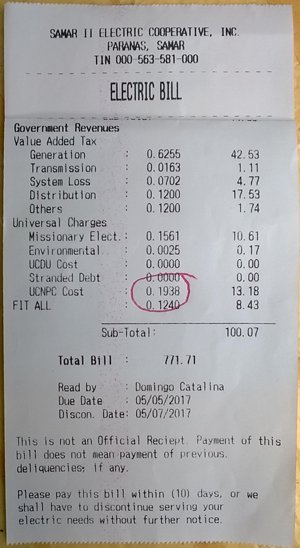'Killing us softly'
says POWER of ERC's decision to allow PSALM to continue collecting
P53.8B in stranded contract costs from consumers
Press Release
March 30, 2017
QUEZON CITY –
Consumer group People Opposed to unWarranted Electricity Rates (POWER)
today slammed the Energy Regulatory Commission (ERC) for allowing the
Power Sector Assets and Liabilities Management Corporation (PSALM) to
continue charging electricity consumers with a 19 centavo/kWh
universal charge to pay for its stranded contract costs.
 In an order dated March 6
but released only on March 27, the ERC indefinitely extended PSALM's
P0.1938/kWh universal charge originally allowed from April 2013 to
February 2017. The charge was supposed to cover PSALM's stranded
contract costs of P53.851 billion incurred from 2007-2010. But the ERC
said PSALM was only able to collect P48 billion by February 2017, thus
it should be allowed to charge consumers P5.5 billion more in the
coming months.
In an order dated March 6
but released only on March 27, the ERC indefinitely extended PSALM's
P0.1938/kWh universal charge originally allowed from April 2013 to
February 2017. The charge was supposed to cover PSALM's stranded
contract costs of P53.851 billion incurred from 2007-2010. But the ERC
said PSALM was only able to collect P48 billion by February 2017, thus
it should be allowed to charge consumers P5.5 billion more in the
coming months.
"The amount might seem
small, but they have been charging this to millions of consumers for
the last four years, translating to billions already. With ERC's
action, consumers will most likely be paying even more for the next
nine years. They're killing us softly," said POWER Convenor and former
Bayan Muna Rep. Teddy Casiño.
PSALM's stranded costs are
due to the onerous "take or pay" provisions in NAPOCOR's contracts
with Independent Power Producers (IPPs) which allowed IPPs to charge
NAPOCOR even for unused power. It is similar to the much-hated "power
purchase adjustment (PPA)" that was abolished under the Arroyo
administration. Most of the contracts were signed during the Ramos
administration but was continued by succeeding governments, resulting
in huge stranded contract costs.
Due to strong opposition to
the passing on of such costs to consumers, it was only in 2013 that
PSALM was able to get ERC approval. But said charge was supposed to
have ended last February.
By extending the 19-centavo
universal charge, POWER says the ERC is setting a bad precedent for
PSALM to charge additional stranded contract costs covering the years
after 2010, including stranded debts estimated at P245 billion. At
present, PSALM has pending applications in the ERC to pass on P35
billion in stranded debts and P70.12 billion in stranded contract
costs to electricity consumers. This will be reflected in monthly
power bills for the next nine years, at least.
“Electricity consumers are
being made to suffer the consequences of NAPOCOR and PSALM's bad
decisions. The original debt to be passed on to consumers was only
P255 billion in 2001 as mandated by the Electric Power Industry Reform
Act (EPIRA). This was supposed to be covered by the sale of NAPOCOR's
assets. But the reverse happened and PSALM was left with an even
bigger debt plus stranded contract costs. Why should our people suffer
for PSALM's incompetence? This is unjust and cruel, considering we
already have the highest power rates in Asia!" said Casiño.
Last January, Energy
Secretary Alfonso Cusi announced that the Malampaya Fund would be used
instead to cover PSALM's stranded debts and stranded contract costs so
as not to burden consumers. "So why is the ERC now allowing PSALM to
continue charging consumers for something that the government already
said it would shoulder?" asked Casiño.
Casiño called on Congress to
investigate ERC's actions and said POWER was studying options to file
with ERC or the Courts to put a stop to PSALM's charging of its
stranded debts and costs to consumers.